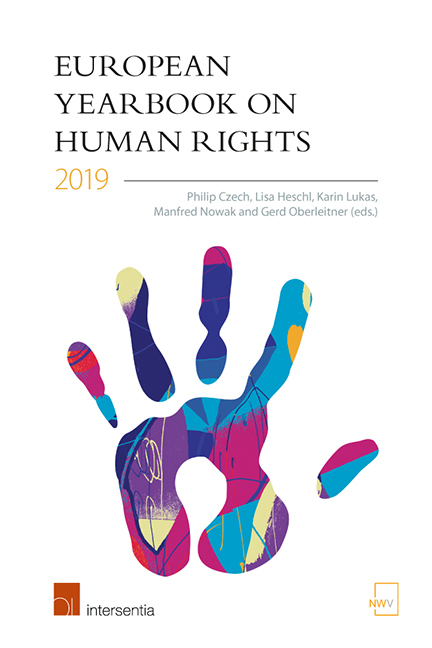Book contents
- Frontmatter
- Miscellaneous Frontmatter
- Editors’ Preface
- Contents
- List of Abbreviations
- List of Contributors
- PART I TOPIC OF THE YEAR
- PART II EU
- PART III CoE
- PART IV OSCE
- PART V REPORTS FROM THE FIELD
- PART VI OTHERS
- The Legal Authority and Recognition of the Universal Declaration of Human Rights: Conceptions, Developments and Practice
- Teaching Human Rights at School: A Survey of Persisting Challenges to the Practice
- Human Rights Implications for Vulnerable Migrants in Light of the EU and Italian Migration Policies
- The Russian Constitutional Court as a Mediating Link between Russian and European Law?
- PART VII BOOK REVIEWS
- Index
Teaching Human Rights at School: A Survey of Persisting Challenges to the Practice
from PART VI - OTHERS
Published online by Cambridge University Press: 24 January 2020
- Frontmatter
- Miscellaneous Frontmatter
- Editors’ Preface
- Contents
- List of Abbreviations
- List of Contributors
- PART I TOPIC OF THE YEAR
- PART II EU
- PART III CoE
- PART IV OSCE
- PART V REPORTS FROM THE FIELD
- PART VI OTHERS
- The Legal Authority and Recognition of the Universal Declaration of Human Rights: Conceptions, Developments and Practice
- Teaching Human Rights at School: A Survey of Persisting Challenges to the Practice
- Human Rights Implications for Vulnerable Migrants in Light of the EU and Italian Migration Policies
- The Russian Constitutional Court as a Mediating Link between Russian and European Law?
- PART VII BOOK REVIEWS
- Index
Summary
ABSTRACT
Using as a starting point Sen's theorisation on going beyond a purely legal approach to human rights (2005), this contribution advocates for the crucial role of education as an enabler of a public discussion to encourage the realisation of human rights. Learning about, for, and through human rights has the potential to be a transformative experience in which they are recognised and enacted by all of those engaged in the process – educators and learners alike. One way of looking ‘outside the box’ of human rights-related legislation (Sen, 2005) is developing and implementing human rights education (HRE) initiatives, in order to provide learners with the knowledge, skills and attitudes necessary to foster a social change consistent with a culture of human rights. However, several scholars have pointed to the limitations of introducing human rights education in formal schooling beyond nominal curricular and textbook reviews. In an effort to illustrate some of these challenges, this contribution discusses recent scholarship from the European region, using a three-pronged perspective inspired by the vertical case study approach proposed by Bartlett and Vavrus (2006, 2009 and 2014). Among the findings of this contribution, a salient issue is that the state-level decision to provide HRE in formal education is not always aligned with the recommendations stated on the international legal frameworks, depending on factors such as the current political agenda, the education system's structure, and the strength of the civil society. Further, the classroom practice is most likely affected by teachers’ perceptions of the concept of human rights and their understanding of the written policy. Therefore, teacher agency could be considered a crucial aspect when studying the introduction of HRE in formal education, as it would provide further insights on the limitations of teaching human rights in the classroom and how to overcome them.
INTRODUCTION
The year 2015 got off to a grim start in Western Europe: carefully executed terrorist attacks took place in France and Denmark, targeting widely known cartoonists and journalists as well as civilians. Across the continent, high- level authorities and the media rallied to defend before public opinion the values of freedom of speech and religious tolerance. A couple of weeks after the attacks, several European Union (EU) Education Ministers gathered in Paris in an informal meeting convened by the then French Minister of Education, Najat Vallaud-Belkacem.
- Type
- Chapter
- Information
- European Yearbook on Human Rights 2019 , pp. 495 - 516Publisher: IntersentiaPrint publication year: 2019



